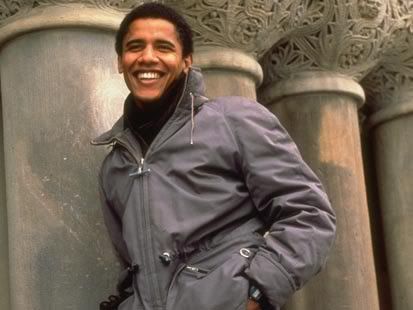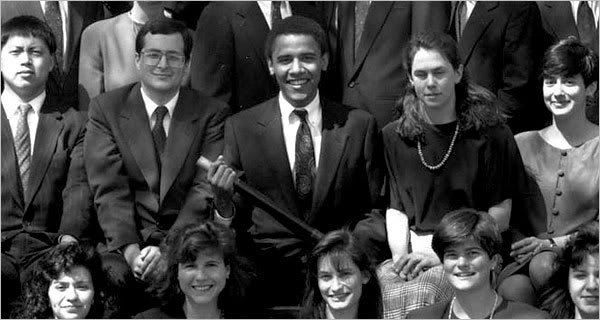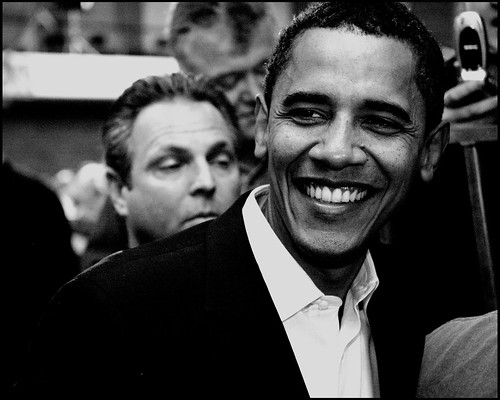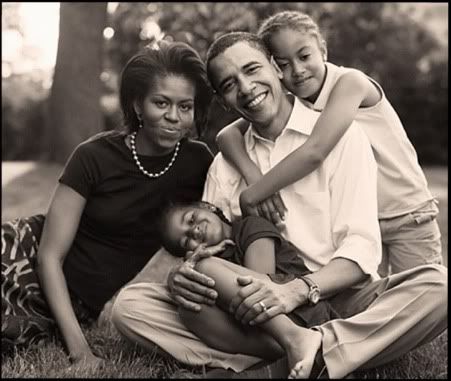This will be the final installment of my “Obama: The Only Thing You Need to Know” series, which will also be my “closing argument”. For what it's worth, I've been for an Obama presidency since 2004.
To me, it didn't matter when, or where, or how it happened. When you see a brilliant, inspiring man with real integrity and progressive ideals have a shot at the Presidency, it is my belief that you jump in head first and do everything you possibly can to make him the next President of the United States.
But where did this man come from? I was determined to find out..
(Cross-Posted at DailyKos and Blue Hampshire)
First, I listened to his books on tape on my way to work every day. If you haven't heard him read them himself, you should. If for no other reason than to grasp the simple brilliance of having a President who can pronounce Arab and African language words impeccably.
Then I did further research. I followed his record in the Senate and his coverage in the press. Then my dream came true: He announced he'd be running for President of the United States.
But where did this man come from? Well, I learned through my research and through his books that after a lukewarm career in school, he blossomed at Columbia.
Fresh out of school, he took a job as a community organizer on the south side of Chicago(Part 4).
His 1995 memoir, Dreams from My Father, recounts his idealistic effusions: “Change won't come from the top, I would say. Change will come from a mobilized grass roots. That's what I'll do. I'll organize black folks. At the grass roots. For change.”

One important thing I think needs to be understand from that time, as made clear by the American Prospect:
The reason the conservative power structure has been so dangerous, and is especially dangerous in opposition, is that it can operate almost entirely on bad faith. It thrives on protest, complaint, fear: higher taxes, you won't be able to choose your doctor, liberals coddle terrorists, etc. One way to deal with that kind of bad-faith opposition is to draw the person in, treat them as if they were operating in good faith, and draw them into a conversation about how they actually would solve the problem. If they have nothing, it shows. And that's not a tactic of bipartisan Washington idealists — it's a hard-nosed tactic of community organizers, who are acutely aware of power and conflict. It's how you deal with people with intractable demands — put ‘em on a committee. Then define the committee's mission your way.
Obama then went on to Harvard Law, where he graduated with honors and became editor of the Harvard Law Review, the first time a black student had held that post.
Fresh out of Law School, he took a job running Project Vote! while writing his first book(Part 3).
Obama shrugs off the possibility of running for office. “Who knows?” he says. “But probably not immediately.” He smiles. “Was that a sufficiently politic 'maybe'? My sincere answer is, I'll run if I feel I can accomplish more that way than agitating from the outside. I don't know if that's true right now. Let's wait and see what happens in 1993. If the politicians in place now at city and state levels respond to African-American voters' needs, we'll gladly work with and support them. If they don't, we'll work to replace them. That's the message I want Project Vote! to have sent.”

His next job was as a Civil Rights attorney, fighting for the rights of ordinary citizens(Part 2).
Obama was part of a team of attorneys who represented the Association of Community Organizations for Reform Now (ACORN) in a lawsuit against the state of Illinois in 1995 for failing to implement a federal law designed to make it easier for the poor and others to register as voters.
Obama also wrote a major portion of an appeals brief on behalf of a whistleblower who exposed waste and corruption in a research project involving Cook County Hospital and the Hektoen Institute for Medical Research and alleged that she was fired in retaliation.
The case was settled out of court. The county agreed to pay the federal government $5 million, part of which went to the whistleblower, Dr. Janet Chandler. Hektoen agreed to pay $500,000 to the government plus $170,000 to Chandler for wrongful termination.
Obama was part of a team of lawyers representing black voters and aldermen that forced Chicago to redraw ward boundaries that the City Council drew up after the 1990 census. They said the boundaries were discriminatory.
After an appeals court ruled the map violated the federal Voting Rights Act, attorneys for both sides drew up a new set of ward boundaries.

“I don't know if we have had a president that knows as much about the founding document as he does.” – Professor Cass Sunstein, University of Chicago

Barack Obama at some point decided that agitating from the outside, indeed, would get less done than working from the belly of the beast. And thus started out his political career in the down and dirty world of the Illinois Senate(Part 6).
What if a politician were to see his job as an organizer, as part teacher and part advocate, one who does not sell voters short but who educates them about the real choices before them?”
With the assistance of Senator Jones, Mr. Obama helped deliver what is said to have been the first significant campaign finance reform law in Illinois in 25 years. He brought law enforcement groups around to back legislation requiring that homicide interrogations be taped and helped bring about passage of the state’s first racial-profiling law. He was a chief sponsor of a law enhancing tax credits for the working poor, played a central role in negotiations over welfare reform and successfully pushed for increasing child care subsidies.
Sounds like an impressive record to me. These, of course, are the high points to his State Senate career. They're also bills that he sponsored. A more complete record can be found [in the diary]. Some other high points in his voting record include raising the minimum wage, ending $300 million dollars in tax breaks for corporations, shielding workers from having overtime pay taken away, funding stem cell research, sponsoring a study of ways to implement universal healthcare, reducing the cost of prescription drugs, and unsuccessfully co-sponsoring a ban on discrimination based on sexual orientation (The measure became law after Obama was elected to the U.S. Senate). DAMN impressive.

Then, of course, one could hardly forget his family, especially the wonderful Michelle Obama, and the presence and grace she will bring to the table as first lady(Part 5).
I would constantly tamp down expectations because they're not realistic. There is still a lot of hard work that we as a country need to do. They can't look to any one individual, whether it's Barack or it's the next new hope that's going to appear to be that savior. And I would just hate for people to sort of see this potential and think: Oh, now I can rest easy because Barack Obama is going to fix things. It doesn't work that way.

Barack Obama has been in Iowa this week. He's been saying:
My experience is rooted in the lives of the men and women on the South Side of Chicago who I fought for as an organizer when the local steel plant closed. It’s rooted in the lives of the people I stood up for as a civil rights lawyer when they were denied opportunity on the job or justice at the voting booth because of what they looked like or where they came from. It’s rooted in an understanding of how the world sees America that I gained from living, traveling and having family beyond our shores — an understanding that led me to oppose this war in Iraq from the start. It’s experience rooted in the real lives of real people, and it’s the kind of experience Washington needs right now.
Barack's life story speaks to his character and his ideals in ways that few speeches could. Barack's story is the story of a man who lead his life by example, who championed the causes that were hard to champion, and who brought power to the powerless at times when few thought it possible.
Barack Obama had already changed the world before the world knew his name. It's only fitting that now that everyone sees the amazing story of this man, he will be able to change the world in more radical and sweeping ways. But the world needs small, forgotten change, as much as it needs wide sweeping change.
And no matter what happens from here on out, we can all be thankful to Barack Obama for that.
I, however, would prefer that he become the next President of the United States. I hope you agree.
As Barack Obama likes to say:
Let's go change the world.

1 Comment
Let's not forget that Barack will work hard to undo Bush's Signing Statements
Something Clinton may not work so hard at. Barack has signed the anti-torture pledge from the AFC, which Hillary and Edwards BOTH refuse to do.
And of course Hillary and Edwards did NOT read the full NIE before voting YES on the Authorization of Force in 2002, while Barack was vehemently opposed to the war. The NIE said there were no WMDs in Iraq since 1995…
Here is Barack’s speech on the war:
dems-will-win Wed 2 Jan 9:42 AM